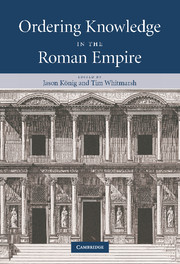Book contents
- Frontmatter
- Contents
- Preface
- Notes on contributors
- List of abbreviations
- Part I INTRODUCTION
- Part II KNOWLEDGE AND TEXTUAL ORDER
- Part III KNOWLEDGE AND SOCIAL ORDER
- 8 Knowledge and power in Frontinus' On aqueducts
- 9 Measures for an emperor: Volusius Maecianus' monetary pamphlet for Marcus Aurelius
- 10 Probing the entrails of the universe: astrology as bodily knowledge in Manilius' Astronomica
- 11 Galen's imperial order of knowledge
- Bibliography
- Index
8 - Knowledge and power in Frontinus' On aqueducts
Published online by Cambridge University Press: 28 August 2009
- Frontmatter
- Contents
- Preface
- Notes on contributors
- List of abbreviations
- Part I INTRODUCTION
- Part II KNOWLEDGE AND TEXTUAL ORDER
- Part III KNOWLEDGE AND SOCIAL ORDER
- 8 Knowledge and power in Frontinus' On aqueducts
- 9 Measures for an emperor: Volusius Maecianus' monetary pamphlet for Marcus Aurelius
- 10 Probing the entrails of the universe: astrology as bodily knowledge in Manilius' Astronomica
- 11 Galen's imperial order of knowledge
- Bibliography
- Index
Summary
INTRODUCTION
During his lifetime, Sextus Julius Frontinus was ‘one of the most important figures of the Flavio-Trajanic era’. Little is known for certain about his early career, but by the time of his death in 103/104 ce he had not only served as Governor of Britain, Proconsul of Asia, Curator aquarum (Guardian of the aqueducts) and Augur, but had also been made consul three times, twice with Trajan himself as his colleague. Triple consulships were only rarely bestowed on men outside the imperial family in this period, so scholars have suggested that these singular distinctions may be proof that Frontinus played a significant role in Trajan's succession as emperor, and perhaps even in Nerva's elevation to the ‘post’. indeed, it is tempting to wonder if Frontinus was himself ever a candidate for Nerva's job. In spite of having been ‘one of the most successful and influential senators of the latter part of the first century’, however, Frontinus is best remembered today as the author of a number of so-called ‘technical’ treatises and consequently languishes, largely forgotten, at the margins of classical scholarship.
Most of those who have had any contact with his surviving texts have argued, or assumed, that they are straightforward, practical manuals, which may be of interest to specialist historians but which have little to recommend themselves to a wider readership. At first sight, they do perhaps give that impression.
- Type
- Chapter
- Information
- Ordering Knowledge in the Roman Empire , pp. 177 - 205Publisher: Cambridge University PressPrint publication year: 2007
- 7
- Cited by



